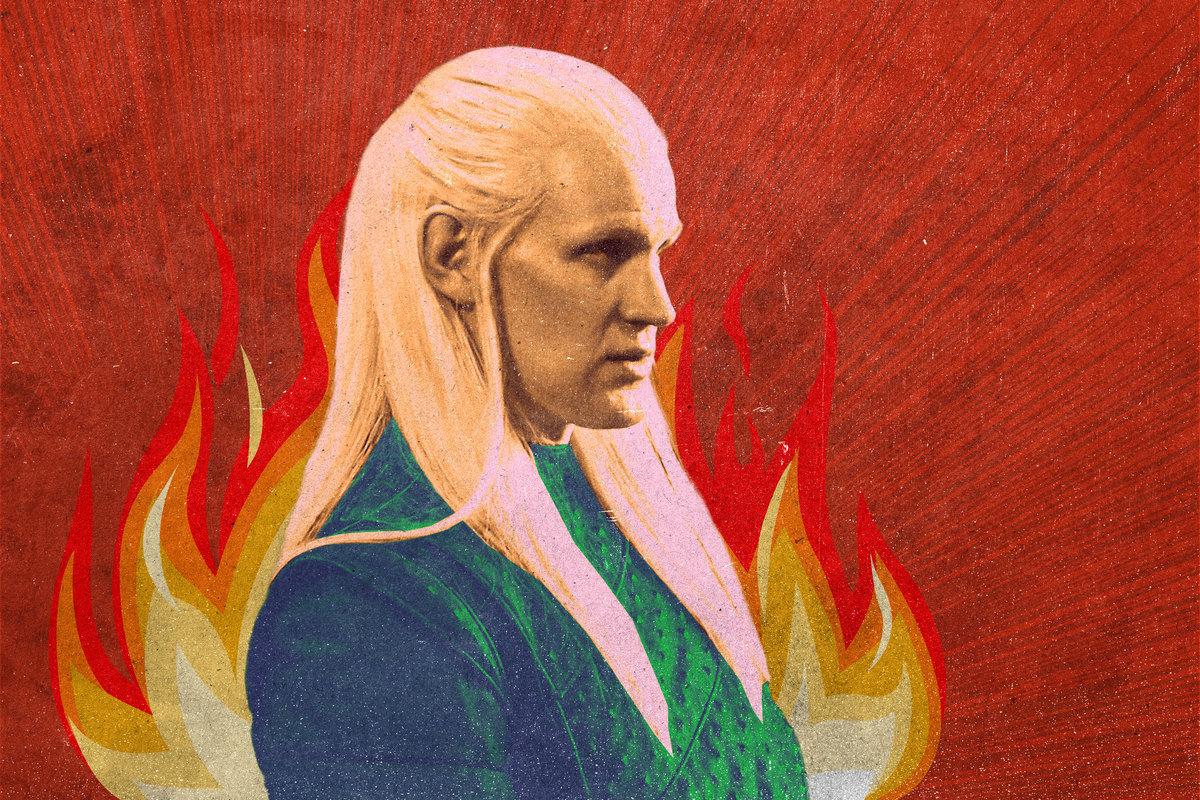Introducing Daemon, Your New Problematic Targaryen Fave
No one hammers home the feeling that ‘Game of Thrones’ is back more than Matt Smith’s prince, the swaggering, morally complex breakout character of the ‘House of the Dragon’ premiere

Daemon Targaryen first becomes conspicuous by his absence. When House of the Dragon introduces King Viserys’s Small Council, five men are present at the Targaryen ruler’s table. One, Master of Ships Corlys “the Sea Snake” Velaryon, sits on a slant, disrupting the table’s symmetry and symbolizing the urge for action that puts him at odds with his complacent peers. Another chair, at the king’s left hand, sits empty altogether: That’s the one intended for Daemon, brother of Viserys and commander of the City Watch. Lord Lyman Beesbury, Master of Coin, suggests that Viserys might urge his brother to stop playing hooky from meetings, but Viserys dismisses his concern. The point of appointing his brother to a council seat, Viserys says, isn’t to enforce the fiscal responsibility of the City Watch, but to ensure that “Daemon is distracted by his present task, and that his thoughts and energies are occupied.”
In the following scene, we see why it might be best for Viserys to keep his brother busy. Daemon, we learn, was absent from his council chair because he had a more imposing seat in mind: the Iron Throne. When Princess Rhaenyra enters the Great Hall within the Red Keep, she finds her uncle Daemon lounging in her father’s chair—which, he hopes, will be his someday. Maybe someday soon.
With that juxtaposition of seats—the “dreadfully boring” one he can’t be confined to, and the forbidding and forbidden one he wants—Daemon establishes himself as the breakout character of House of the Dragon’s opening act. The Game of Thrones prequel’s premiere eases the audience into Westeros’s past and the franchise’s future not only with the aid of exposition, but by providing plenty of audiovisual links to the original series, including Miguel Sapochnik’s direction, King’s Landing’s opulent halls and decadent brothels, and snatches of composer Ramin Djawadi’s familiar Thrones theme. But nothing hammers home the feeling that Thrones is back more than Matt Smith’s Targaryen prince, a swaggering, charismatic killer like Euron Greyjoy and Bronn before him, mixed with the moral complexity and privilege of Jaime Lannister. One episode in, Daemon is shaping up to be the prequel’s problematic fave.
HBO’s casting of the 39-year-old Smith, best known for playing Doctor Who’s Eleventh Doctor, The Crown’s first Prince Philip, and Morbius’s much-memed Milo, wasn’t universally celebrated when it was rumored or revealed. Some fans of Fire & Blood, the George R.R. Martin tome on which the prequel is based, didn’t think Smith could do justice to Daemon, the impetuous, murderous, promiscuous prince whom Viserys can’t control. Granted, Smith had played an abrasive, intimidating, and possibly philandering prince before, but The Crown’s Duke of Edinburgh was merely a bad boy compared to Queen Elizabeth; he’s basically a choir boy by Targaryen standards. Other objections to Smith centered on his not looking like a Targaryen, which the first set photos of Smith wearing a wig did little to dispel. (To be fair, Smith has said that he “couldn’t quite figure myself out in a blonde wig” either.) About the best one could say about the #NotMyDaemon campaign is that it was a change from the typical toxic pattern for this sci-fi/fantasy series casting complaint to be about a white guy.
Admittedly, Morbius didn’t come out until this April. But after Smith went viral as a bloodthirsty vampire who’s comfortable dancing shirtless, it’s not so surprising that he’d have the range to play Prince Daemon. From the get-go, Smith is superb, alternating between creepy, petulant, dashing, and deadly. Daemon is an eye-catching character, but he’s also the straw that stirs the drink at the king’s court, creating much of the early conflict as he tests his brother’s patience and, in the process, exposes Viserys’s vulnerability. It makes perfect sense that HBO had him narrate the prequel’s first teaser.
The premiere draws its core characters clearly and economically; by episode’s end, we have a strong sense of both the central Targaryens (Viserys, Rhaenys, Rhaenyra, and Daemon) and the power players and paramours in their orbit (Corlys, Otto Hightower, Alicent, and Mysaria). Daemon is the most fearsome warrior in Westeros, which the dragonlord demonstrates even on the ground by unhorsing Ser Gwayne Hightower at the king’s joust, and initially outdueling Ser Criston Cole on foot. He’s also arrogant and overconfident: Like Oberyn Martell, he underestimates a prostrate opponent. In contrast to the Red Viper, that mistake doesn’t cost him his life, but it does highlight how lousy a loser he is: When Cole extends an arm to pull him upright after Daemon yields, the prince bats the helping hand away.
Daemon does a lot of that. Viserys has tried to keep him at court by making him Master of Laws and then Master of Coin, but he had the patience for neither, and resents his brother for not making him hand or officially naming him as his heir. Commanding the City Watch is more to his liking, but as evidenced by his brutality in the raid depicted in the premiere, he’s seemingly more motivated by controlling his own fighting force and unleashing his bloodlust than he is by keeping the city safe. (If I lived in Flea Bottom, I’d rather take my chances with cutpurses than end up in a dark alley with Daemon and Dark Sister.) Only after slaughtering smallfolk without due process does Daemon take his seat at the council—still sporting the armor he wore while hacking off heads and limbs the night before. (That’s what we’d call a walk of maim.)
Once there, he adeptly trolls Ser Otto, Viserys’s hand, who has the comedic sensibilities of Tywin Lannister or Stannis Baratheon. Daemon, Smith has said, is “there to cause chaos and piss people off” for his own entertainment, and Otto is his most frequent target. Hightower, who stiffly rises to the bait, sees Daemon for the threat he is, but he lacks the prince’s captivating qualities—and he also lacks the blood of the dragon, a bond that’s long blinded Viserys to his brother’s aspirations. The advisor at Viserys’s right hand knows what the one at his left hand is doing, but the king can’t quite see the problem the prince poses.
That’s the beauty of Daemon as a character: In addition to showing us who he is, he also shows us who others are. Viserys is a mostly well-meaning monarch, less cruel, quick-tempered, and hard-headed than his younger brother, but he’s also slow on the uptake and easily influenced. Viserys can’t conceive of his brother turning against him; “Daemon has ambition, but not for the throne,” he confidently declares, while Daemon, who has every ambition, lurks and laughs just outside the council chamber. Later, Viserys tells Daemon that he has “no allies at court but me,” which we know not to be true: Corlys, at least, a fellow martial man, sees Daemon as a kindred spirit of sorts, and Rhaenyra has a soft spot for him too. Daemon tells his older brother than he looks like the spitting image of Aegon of old, but outwardly, Daemon cuts the kinglier figure. Viserys doesn’t seem so divine: His dragon is dead, he leans on a sword but doesn’t wield one, and he’s sliced by his own throne. Viserys’s subjects seem to follow him because the Great Council decreed it, whereas Daemon’s gold cloaks and brothel buddies feel real loyalty to and affection for him.
The debut episode highlights the duality of Daemon: the glittering “Prince of the City,” who draws ovations from the crowd as he thunders through the lists, and “Lord Flea Bottom,” who has a Tyrion-esque taste for women and wine, incautiously gloats about his nephew’s death, cheats on his wife with Mysaria, and considers silver hair a turn-on. Speaking of which: The handsy, possessive way he fastens a Valyrian steel necklace around Rhaenyra’s neck would not be a normal niece-uncle interaction outside of the incestuous Targaryen clan. Then again, the ostensibly honorable Otto trying to set up his young daughter with the much older king is unsettling, too. Between all the underage ickiness, the Great Council’s decree, Rhaenyra’s struggle for respect, and Viserys sacrificing Aemma to save his son, it’s clear what kind of world we’re in—and Daemon is very at home here.
Smith may not resemble Prince Charming as closely as Nikolaj Coster-Waldau, but that’s OK, because Daemon’s charm can’t compare to Jaime’s, either: He’s not quite as likable as the Lannister twin was, which is saying something considering Jaime had sex with his sister and tried to kill a kid in the first episode of Thrones. Jaime was a kingslayer, but—unbeknownst to everyone but Brienne—for virtuous reasons. On the surface, there’s nothing very virtuous about Daemon. Judging by his insubordinate streak and (sometimes literally) naked ambition, some members of the council suspect that Daemon might have his own appetite for king-killing—which, given his Targaryen blood, would make him a kinslayer, too. On some level, though, Daemon loves Viserys, craves his respect, and believes he can help him. But if he can’t get validation from his older brother, then he might destroy him instead, as Jimmy McGill did to his big bro in another high-profile prequel. As with Saul Goodman or Anakin Skywalker, there’s a pitiable, tragic quality to Daemon, a plaintive fragility to his boasting and needling that hints at his pain. Targaryens often fight and fuck each other, but they should really try talking for a change.
Soon enough, the fire will burn and the blood will flow. For now, though, House of the Dragon revolves around indoor intrigue, genuinely nail-biting social climbing, and conversations whose subtexts are at least as loud as their words. Thrones thrived on political maneuvering, and Dragon does it well too, but the audacious, indiscreet Daemon provides a welcome break from the posturing and prevaricating. He also expands the palette of the series, both because he associates with a less aristocratic crowd and because he’s not purely a creature of the Red Keep. At the end of the premiere, Viserys banishes his brother for joking about Baelon, the “heir for a day.” As a consequence, Daemon isn’t around to pledge fealty to Rhaenyra—and when we see him next, we’ll actually leave King’s Landing.
Daemon’s hopes of sitting the Iron Throne suffered a setback on Sunday, but fans’ hopes for the character and opinions of Smith’s suitability for the role can only have improved. Thrones excelled at creating characters whom viewers sometimes loved to hate and at other times hated to love—figures whose morality and likability slotted in somewhere between the upstanding Ned Starks and depraved Ramsay Boltons. Daemon, whom Smith has described as “sort of an outsider” who’s “not black and white,” occupies that sometimes-sour, sometimes-sweet spot: He speaks loudly and carries a big sword, and he puts the D in Hot D. When Viserys says he hopes Daemon won’t have to maim half the populace to make his city safe, the prince answers, “Time will tell.” Viserys already has a festering sore on his back; time will also tell whether he’ll be stabbed in the back by his brother as well.

